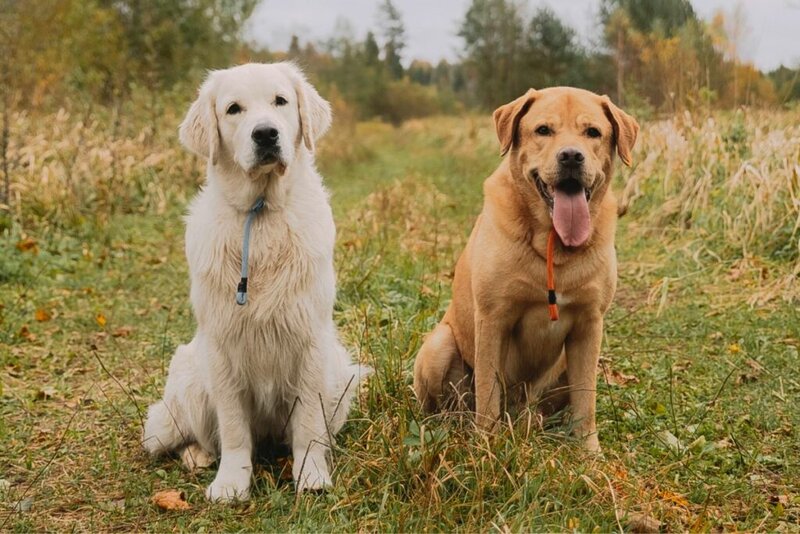“Are Golden Retrievers good guard dogs?” This question frequently comes up among prospective dog owners and safety-conscious families. In today’s read, let’s explore the potential of Golden Retrievers as guardians of your home and family, examining both their natural capabilities and limitations in this important role.
Understanding the Term “Guard Dog”

Before we dive into whether Golden Retrievers can serve as guard dogs, it’s essential to understand what this term actually means. Guard dogs are specifically trained canines that serve to protect both their owners and property. This specialized role requires specific traits and training that set them apart from regular family pets. They typically fall into three distinct categories that serve different security purposes:
- Alarm dogs: These dogs focus primarily on alerting their owners to potential threats. They’re trained to bark at unfamiliar presences but aren’t expected to engage physically with intruders. This is the most basic level of protective service a dog can provide, making it accessible to many breeds, including family-oriented ones.
- Protection dogs: Moving up the scale, these dogs combine alerting capabilities with protective behaviors. They’re trained to both warn and deter, making them suitable for property protection while still being safe around family. These dogs require more intensive training and natural protective instincts to perform their duties effectively.
- Security dogs: These are the most intensively trained guard dogs, typically found in professional security settings. They’re capable of both detection and engagement, making them suitable for law enforcement and military applications. These dogs undergo rigorous training programs and are selected from breeds known for their protective capabilities.
It’s worth noting that proper guard dogs undergo specialized training that sets them apart from regular pets. This training often emphasizes territorial behavior and protective instincts over socialization, making them quite different from typical family dogs. The training process can take months or even years, depending on the level of protection required and the individual dog’s natural abilities.
Evaluating Golden Retrievers’ Guard Dog Potential
When considering Golden Retrievers as guard dogs, we need to examine their natural characteristics and how these align with guard dog requirements. Their inherent sweetness and sociability make them exceptional family pets, but these same traits can present challenges when it comes to protective duties. Understanding these characteristics is crucial for setting realistic expectations about their potential as guard dogs.
Let’s explore the characteristics that might limit their effectiveness as guard dogs:
- Inherent friendliness: Golden Retrievers are naturally inclined to view everyone as a potential friend, making them less likely to display protective behaviors. This friendly disposition is deeply ingrained in their breeding history as family companions and hunting partners.
- Gentle temperament: Their soft-hearted nature, while endearing, doesn’t align well with the more assertive personality required of guard dogs. Golden Retrievers typically avoid confrontation and prefer peaceful interactions with both humans and other animals.
- Social orientation: These dogs thrive on human interaction and often seek attention from strangers, which can compromise their effectiveness as deterrents. Their natural instinct to greet visitors warmly can work against their potential as security animals.
- Limited protective instincts: While loyal to their families, Golden Retrievers typically lack the natural protective drive found in traditional guard dog breeds. Their breeding history focused more on cooperation and gentleness rather than protection.
- Optimistic outlook: Their generally happy disposition makes them less likely to perceive potential threats in their environment. This positive attitude, while wonderful for family life, can make them less effective at identifying and responding to genuine security concerns.
The Hidden Security Potential of Golden Retrievers

While Golden Retrievers might not excel as traditional guard dogs, they possess several qualities that can enhance home security in their own unique way. Understanding these traits can help owners leverage their pets’ natural abilities effectively.
Many successful security dogs don’t rely solely on aggressive behavior, and Golden Retrievers can contribute to home safety through their unique combination of intelligence and alertness. According to experts, here are the positive security traits of Golden Retrievers:
- Physical presence: A mature Golden Retriever’s impressive size alone can serve as a deterrent to potential intruders. Their robust build and strong appearance can make unwelcome visitors think twice before approaching your property.
- Intelligence and trainability: Their high intelligence ranking means they can quickly learn and respond to security-related commands. Golden Retrievers consistently rank among the smartest dog breeds, making them highly capable of learning and executing security protocols.
- Natural alertness: Despite their friendly nature, Golden Retrievers are typically quite observant and will notice unusual activities. Their hunting heritage has endowed them with keen senses and the ability to detect changes in their environment.
- Family dedication: Their strong bonds with family members can manifest as protective behaviors when needed. While not naturally aggressive, Golden Retrievers will often position themselves between their loved ones and perceived threats.
- Vocal capabilities: Golden Retrievers have strong barking abilities that can effectively alert their families to unusual situations. Their deep, resonant bark can serve as an excellent deterrent and warning system.
Read more >> Are Golden Retrievers Good with Kids
Step-by-Step Guide to Training Your Golden Retriever for Protection
While Golden Retrievers may not become aggressive guard dogs, you can enhance their natural protective instincts through proper training. This comprehensive guide will help you develop your Golden Retriever’s security potential while maintaining their friendly nature:
Step 1: Master the Basics
Begin with fundamental obedience training. Ensure your Golden Retriever responds reliably to basic commands like “sit,” “stay,” and “come.” This foundation is crucial for all further training and establishes you as the pack leader. Spend at least several weeks perfecting these commands in various environments and situations.
Step 2: Develop Alert Barking
Teach your dog to bark on command using a specific word like “speak” or “alert.” Start in a controlled environment and gradually introduce different scenarios that warrant alerting. Use positive reinforcement to reward appropriate barking behavior, and be consistent with your command words.
Read more >> Do Golden Retrievers Bark A Lot?
Step 3: Establish Quiet Control

Balance alert training with a strong “quiet” command. This ensures your dog knows when to stop barking and prevents excessive noise. Practice transitioning between alerting and quieting to give you better control over their vocal responses.
Step 4: Create Boundary Awareness
Train your Golden Retriever to understand property boundaries. Use regular walks to establish perimeter awareness and reinforce territorial understanding. Teach them to recognize the limits of your property and respond appropriately to activity near these boundaries.
Step 5: Practice Situation Assessment
Introduce your dog to various scenarios involving strangers approaching your property. Reward appropriate alerting behavior while discouraging over-excitement. Create controlled training situations with friends acting as strangers to help your dog learn appropriate responses.
Step 6: Build Focus Training
Teach your dog to maintain attention on specific areas or people using the “watch” command. This skill is valuable for monitoring potential threats and can be particularly useful in home security situations. Practice having them watch different areas of your property for increasing periods.
Step 7: Enhance Sound Recognition
Help your dog distinguish between normal and unusual sounds. Practice responses to different noises while reinforcing appropriate reactions. This includes teaching them to recognize the sounds of regular visitors versus unknown approaches.
Step 8: Implement Stranger Protocols
Establish clear guidelines for how your dog should behave around unknown people. Balance their natural friendliness with appropriate caution. Create specific routines for greeting approved visitors versus alerting to unexpected ones.
Step 9: Maintain Consistent Practice
Regular training sessions are essential to reinforce protective behaviors while preserving your Golden Retriever’s friendly nature. Set aside dedicated time each week to practice these skills and maintain their training level.
While training can enhance your Golden Retriever’s protective instincts, their natural temperament will always influence their behavior. Focus on developing their alerting abilities rather than trying to create aggressive responses. Consistent positive reinforcement and patience are key to success.
Conclusion
While Golden Retrievers may not fit the traditional mold of guard dogs, they can still contribute to home security through their natural abilities and proper training. Their combination of intelligence, size, and alertness makes them capable watchdogs, even if they’re unlikely to become aggressive protectors. The key lies in understanding and working with their natural tendencies rather than against them.
Remember that a Golden Retriever’s greatest strength lies in their role as a loving family companion.. With proper training and realistic expectations, these beloved dogs can serve as effective watchdogs while maintaining their gentle, friendly characters. Their presence alone can deter potential intruders, while their intelligence and trainability make them excellent at alerting their families to unusual situations.

As a dedicated pet writer with a passion for Golden Retrievers, I’ve spent years studying and writing information to help owners give the finest care for their beautiful companions. While I do not personally own a Golden Retriever, my writing stems from a genuine love for the breed and a desire to provide useful, well-researched information. My goal is to provide practical and useful advice to Golden Retriever owners on topics such as food selection, common health conditions, and training strategies.


